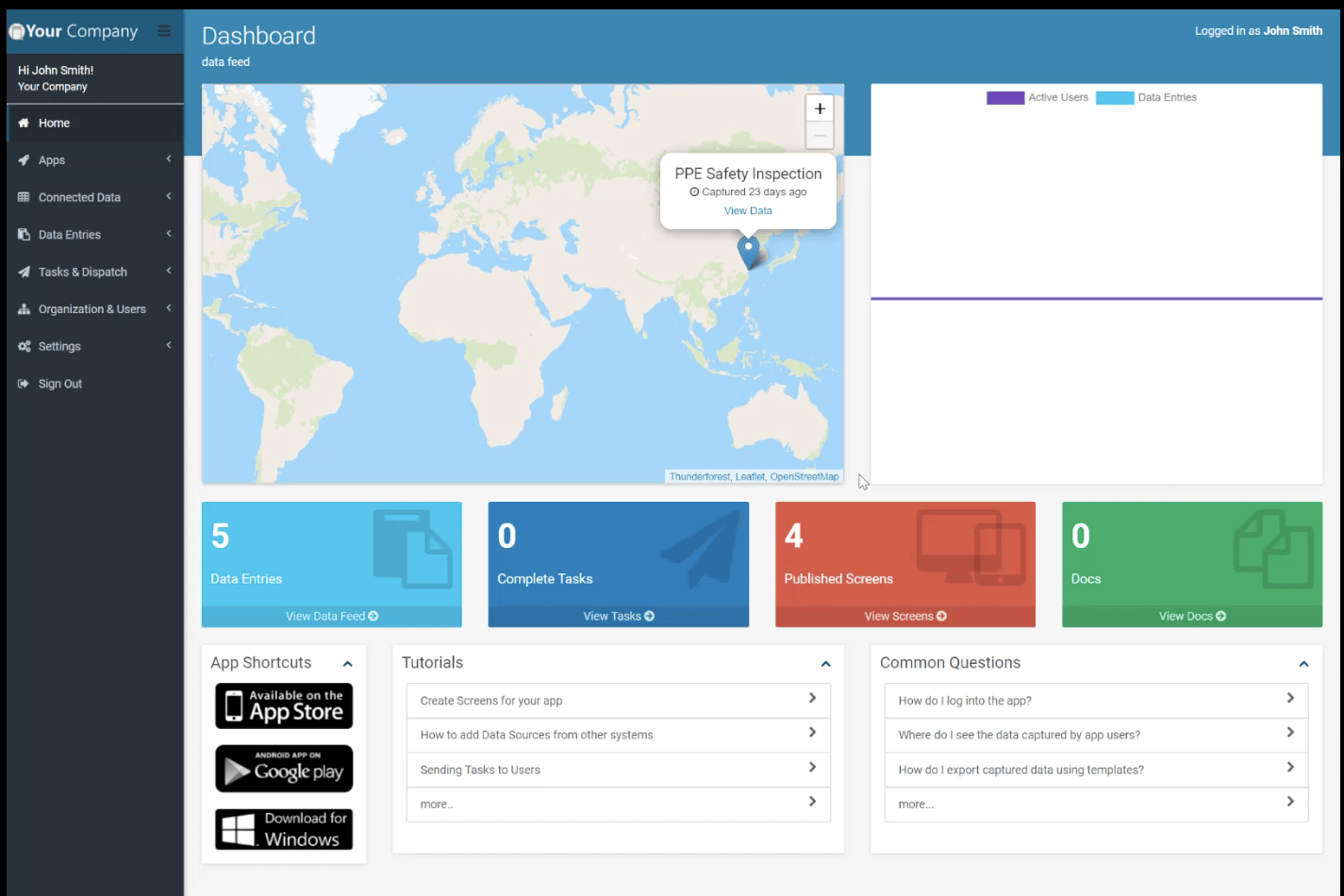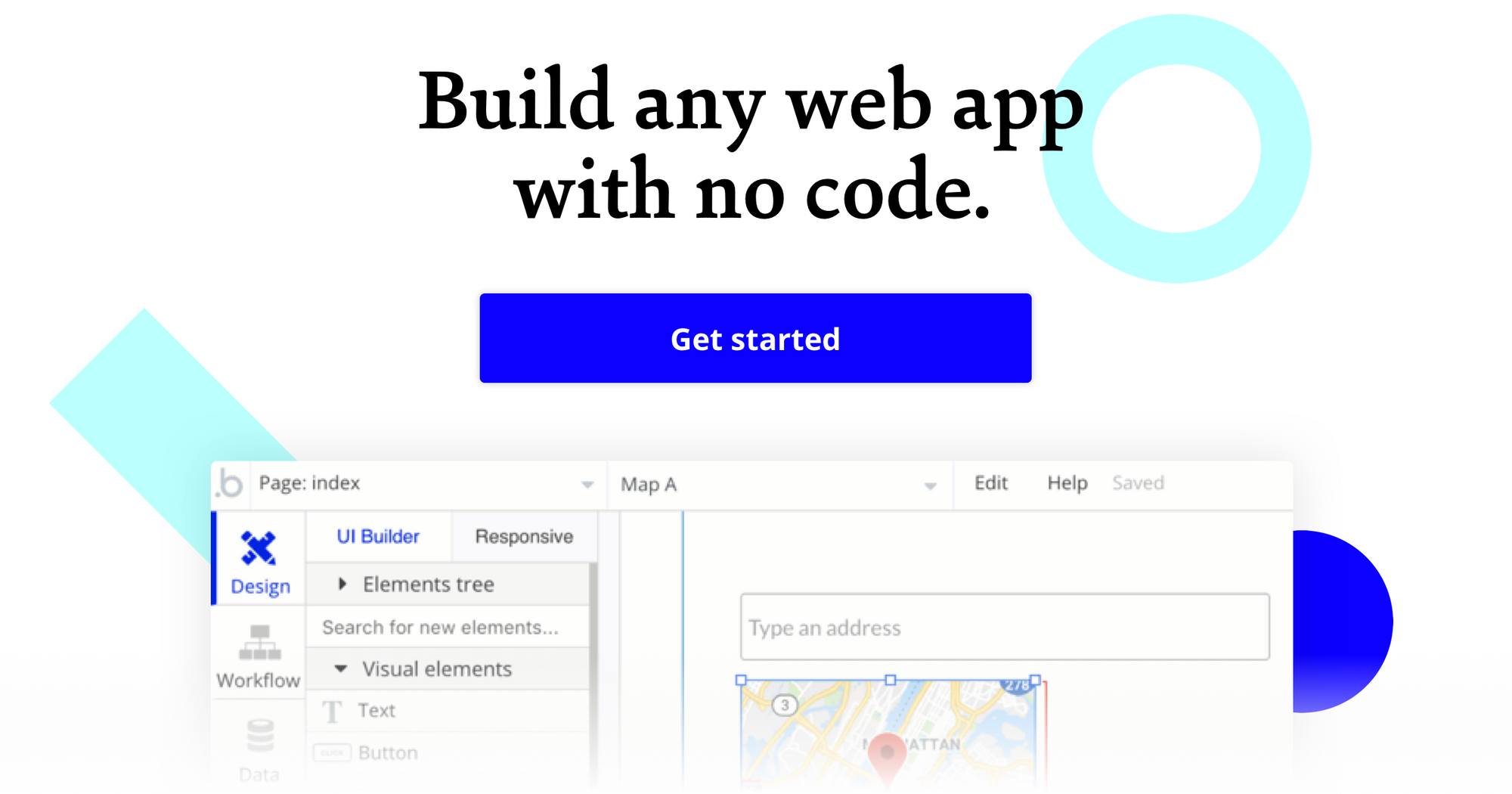At Bubble, we want to enable potential builders to create their ideas without code, so we are exploring and reviewing the many tools and software that entrepreneurs, freelancers, and enterprises might use to build apps.
What is Appenate?
A no-code application creator for internal-facing mobile apps, Appenate helps large enterprise solution providers, vendors, and government entities collect data from their internal teams and securely file it away. Appenate will help you digitize paper forms and checklists and turn them into a smooth, easy-to-use app.
Appenate totes itself for having a drag-n-drop builder, offline access, prebuilt checklists, and both cloud or on-premise storage of your data. In addition to the ability to white label the product as your own, Appenate allows businesses to create internal tools for teams to better sort and organize data.
Appenate integrates with other apps like Salesforce, Google Drive apps, Google BigQuery, and REST API. Using the drag-and-drop interface, you can create workflows to monitor aspects of delivery, collect documentation around worksite safety checks, log road closures, and provide remote task management to team members in the field.
Who is Appenate for?
Appenate’s primary use cases are for building internal tools for enterprise or industries that require a lot of forms. With the prioritization of security features like HIPAA compliance and being GDPR ready, organizations that need to keep data logged securely are a natural fit. The software features use cases for construction, government, disaster management, healthcare, property, and security.
Businesses and organizations managing teams, and needing to log forms in a safe, secure, and easy-to-use manner will benefit from Appenates trusted platform.
Appenate’s Cost & Pricing Models:
(Pricing model evaluated: July 2020)
Appenate’s pricing is based on the number of users per month, with a minimum of 5 users, and quantity discounts appearing to be available for having 25+ users on your app. Each plan offers unlimited storage, different screen types or types of form entries, a standard set of connections, and is available on iOS, Android, and Windows devices. Additionally, optional add-ons are available to purchase through contacting their customer support.
Standard: Appenate’s standard plan starts at $9.90/month per user if paid annually, and $11.90/month per user if paid monthly. It includes the standard features but is limited at 1500 form submissions.
Premium: The Premium plan unlocks additional enterprise-focused features including additional connections, unlimited form submissions, tasking and job dispatch, as well as the ability to manage and store documents like standard operating procedures or safety guidelines.
Optional Add-ons: Appenate offers optional add-ons to increase the functionality of the platform. From increased connectivity tools such as an Enterprise toolkit – allowing you to set up and sync multiple, separate environments from the company account – to Appenate Sync – which will connect and automatically sync data logged in the app to a local SQL database – to additional branded content features like App or Website as a Service feature, giving you the ability to white label the Appenate product, branding the web platform or app to your company’s standards, and published into respective app stores under your name. Lastly, they offer an Appenate Server product which allows you to have full control over all of your data, backups, network security, and choose how you want to upgrade your platform
Appenate vs. Bubble: A Comparison
How does Appenate compare to a no-code platform like Bubble?
The main similarities between Appenate and Bubble include:
Both Appenate and Bubble are no-code app development platforms.
Both Appenate and Bubble equip you with drag-and-drop tools to build the app.
Both platforms offer tutorials or lessons to walk you through getting started.
Both Appenate and Bubble offer basic templates to make getting up and going easier.
Both allow you to integrate with other databases or APIs including Google Sheets, Salesforce, and Google Drive, among others.
Both Appenate and Bubble offer customer support to help those building on their platform to be a success.
The key differences between Appenate and Bubble include:
Price: While Bubble’s starting plan is free and advanced options like Professional or Production plans cost either $115 or $475/month, Appenate has no free plan; the smallest monthly cost would start at around $50/month and would work up from there. In addition, Bubble is priced per app, rather than per user - allowing you to scale the number of users on your app without any additional costs.
Visual Builder: Bubble offers significantly more options when it comes to building out how the app looks and comes with custom branding easily available. Appenate offers some customization, but to white label a feature comes at an added price, also the level of customization is in a more modular format instead of pixel by pixel. With more design freedom, those who are prioritizing a completely customizable design may be better suited for Bubble.
Internal Features: Appenate is largely focused on creating internal tools for their customers. Using drag-and-drop tools, and with templates available for use to build forms, checklists, and even dispatching information, Appenate can be used to replace much of the paperwork often completed on a work site. Bubble allows users to create both internal and end-user apps; templates can be acquired for free and for sale by third parties like Rapid Dev.
Test-drive or Enterprise: While Appenate is largely built for the enterprise audience, Bubble is more suited for the maker or entrepreneur who wants to test an idea, quickly, without code. For quickly prototyping a new app, testing a new solution, or discovering how users interact, Bubble allows for more custom creations, at a lower price point.
Appenate Alternatives
Alternative no-code CMS platforms or tools that allow you to build a web application without code include the following tools:
If you’re looking for an alternative no-code platform with an enterprise focus, Betty Blocks, Quick Base, and Retool are good options.
If you’re looking to build a mobile app, check out Adalo, Glide, DropSource, or Thunkable.
If you’re looking for an internal tool builder, features in Quick Base, or Clay are good alternatives.
If you’re looking for a no-code tool to build out a database of information, Coda, or Airtable are good bets.
If you are a solo entrepreneur who wants to build their own online business or startup affordably and rapidly, no-code platforms like Bubble are a good alternative to Appenate.
About Bubble
Bubble is a leader in the no-code movement. Bubble offers a powerful point-and-click web editor and cloud hosting platform that allows users to build fully customizable web applications and workflows, ranging from simple prototypes to complex marketplaces, SaaS products, and more. Over 400,000 users are building and launching businesses on Bubble - many have gone on to participate in top accelerator programs, such as Y Combinator, and even raise $365M in venture funding. Bubble is more than just a product. We are a strong community of builders and entrepreneurs that are united by the belief that everyone should be able to create technology.
Disclaimer: The goal of these reviews is to provide an honest, practical, differentiated comparison of features and educate readers on tools in the no-code ecosystem so that you can evaluate how these services fit together and serve your needs.
Build your app on Bubble's Free plan. No need to upgrade until you're ready to launch your app.
Join Bubble






